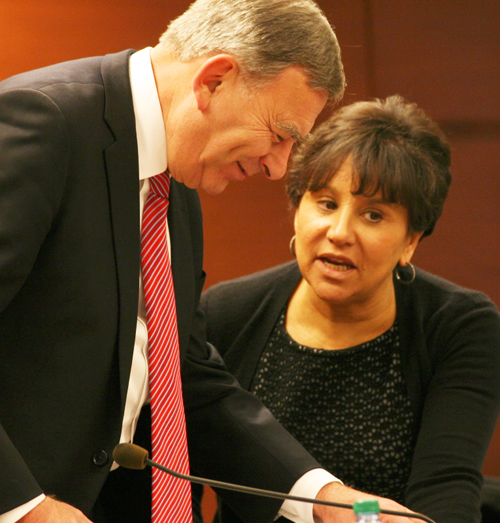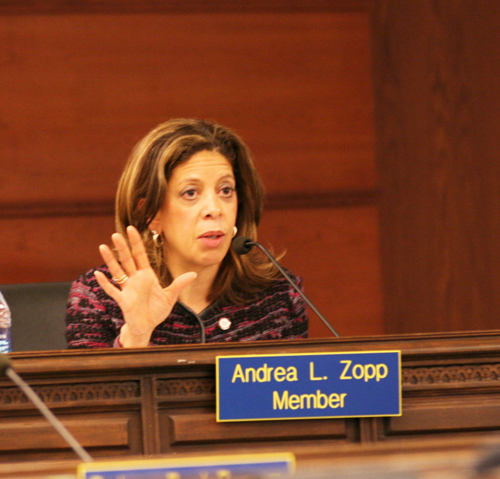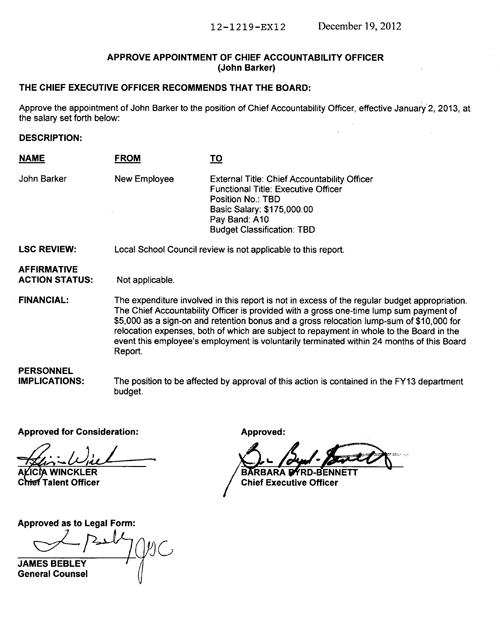Vitale still claims that the SUPES deal was good for CPS, worth the money, former Board President still claims...
 By December 2012, the members of the Chicago Board of Education had gotten rid of their first "Chief Executive Officer" (Jean-Claude Brizard) and hired their second (Barbara Byrd Bennett) and were rubber stamping every corrupt proposal that Byrd Bennett was bringing before the Board. Among those still on the Board in December 2012 (above) was billionaire Penny Pritzker, who was later to leave Chicago to become United States Secretary of Commerce, appointed by Barack Obama. Above, Pritzker is seen talking with millionaire David Vitale (left) before the beginning of the December 2012 Board meeting. Substance photo by David Vance.During the years following his appointment as President of the Chicago Board of Education, David Vitale devoted considerable time to planning how to silence critics of the Board's policies. Vitale's philosophy of debate over CPS policy was, according to observers, "Sit Down and Shut Up!" Those who attended Board meetings regularly (disclosure: including this reporter, who did much of the photography for my colleague Marybeth Foley's BOARDWATCH monthly reports) began to note two major facets of Vitale's time as Board President.
By December 2012, the members of the Chicago Board of Education had gotten rid of their first "Chief Executive Officer" (Jean-Claude Brizard) and hired their second (Barbara Byrd Bennett) and were rubber stamping every corrupt proposal that Byrd Bennett was bringing before the Board. Among those still on the Board in December 2012 (above) was billionaire Penny Pritzker, who was later to leave Chicago to become United States Secretary of Commerce, appointed by Barack Obama. Above, Pritzker is seen talking with millionaire David Vitale (left) before the beginning of the December 2012 Board meeting. Substance photo by David Vance.During the years following his appointment as President of the Chicago Board of Education, David Vitale devoted considerable time to planning how to silence critics of the Board's policies. Vitale's philosophy of debate over CPS policy was, according to observers, "Sit Down and Shut Up!" Those who attended Board meetings regularly (disclosure: including this reporter, who did much of the photography for my colleague Marybeth Foley's BOARDWATCH monthly reports) began to note two major facets of Vitale's time as Board President.
First, Vitale had an arrogant CEO-style disdain for democracy. That arrogance was regularly in display, but was perhaps best indicated by his regular public statements that he and his fellow Board members had the "true facts" (as opposed to the things that had been said during the Public Participation at Board meetings).
Second, Vitale began the process of undermining the "Public Participation" portion of each Board meeting. In order to reduce the number of people who could speak out in public during Board meetings (and who would therefore have their comments -- and facts -- recorded by TV cameras), Vitale claimed that the Board should only allow two hours for all public participation. Then Vitale ruled that since two hours consist of 120 minutes, that meant that only 60 people could testify during any Board meeting -- after all, 2 x 60 = 120.
Those factors, plus the fact that the Board refused to ever discuss most of the major items on the agenda in public led to the most dramatic reduction in democratic public participation in the recent half-century history of the Chicago Board of Education (that's how long I can speak for; the time may have been longer). During the time Vitale served as President of the Chicago Board of Education, observers noted, without joking, that Vitale would have reduced the voice of the public to zero had he been able to, but the limits he placed on the public did the job.
 One of those who regularly voted to rubber stamp the Board Reports submitted by Barbara Byrd Bennett was Board member Andrea Zopp, who served on the Board from May 2011 until July 2015. Zopp, one of those appointed by Mayor Rahm Emanuel, was CEO of the Chicago Urban Leage during her years on the Board. Although the Urban League was supposed to represent the interest of Chicago's Black Community, Zopp voted as the rubber stamp Emanuel expected her to be. After leaving the Board in the summer of 2015, Zopp decided she would run for the United States Senate. Her campaign is presently trying to deny, obfuscate, or cover up all of the votes she made in favor of privatization and other attacks on the city's real public schools. During the December 2012 Board meeting (photo above), for example, Zopp voted in favor of hiring more of Barbara Byrd Bennett's cronies from out of Chicago, most of whom received extra money to relocate to Chicago. Not once did Zopp ask publicly why Chicago teachers and administrators were never qualified for the executive positions Byrd Bennett was creating and the individuals, at six-figure salaries, Byrd Bennett was able to hire because of Zopp's votes. Substance photo by David Vance. Because he wasn't listening to anyone but those who already agreed with him, Vitale missed most of the corruption taking place during Barbara Byrd Bennett's time as "Chief Executive Officer." By the time the $20.5 million no-bid SUPES contract was being implemented, Vitale, had he been listening, would have heard from principals that the SUPES training (called CELA) was an insult to the intelligence and professionalism to the majority of those being trained. Within a few days after CELA began, principals were speaking out against it, some in public. Substance began reporting that principals, who were ordered to go to the CELA events, would sign in at the beginning in the morning, then leave rather than confront those who were doing the "training." The trainers, all well paid by SUPES Academy and virtually all from out of town, didn't even know the simplest facts about Chicago. But they had perfected their Power Point presentations, and were being paid -- no matter what the majority of the principals said.
One of those who regularly voted to rubber stamp the Board Reports submitted by Barbara Byrd Bennett was Board member Andrea Zopp, who served on the Board from May 2011 until July 2015. Zopp, one of those appointed by Mayor Rahm Emanuel, was CEO of the Chicago Urban Leage during her years on the Board. Although the Urban League was supposed to represent the interest of Chicago's Black Community, Zopp voted as the rubber stamp Emanuel expected her to be. After leaving the Board in the summer of 2015, Zopp decided she would run for the United States Senate. Her campaign is presently trying to deny, obfuscate, or cover up all of the votes she made in favor of privatization and other attacks on the city's real public schools. During the December 2012 Board meeting (photo above), for example, Zopp voted in favor of hiring more of Barbara Byrd Bennett's cronies from out of Chicago, most of whom received extra money to relocate to Chicago. Not once did Zopp ask publicly why Chicago teachers and administrators were never qualified for the executive positions Byrd Bennett was creating and the individuals, at six-figure salaries, Byrd Bennett was able to hire because of Zopp's votes. Substance photo by David Vance. Because he wasn't listening to anyone but those who already agreed with him, Vitale missed most of the corruption taking place during Barbara Byrd Bennett's time as "Chief Executive Officer." By the time the $20.5 million no-bid SUPES contract was being implemented, Vitale, had he been listening, would have heard from principals that the SUPES training (called CELA) was an insult to the intelligence and professionalism to the majority of those being trained. Within a few days after CELA began, principals were speaking out against it, some in public. Substance began reporting that principals, who were ordered to go to the CELA events, would sign in at the beginning in the morning, then leave rather than confront those who were doing the "training." The trainers, all well paid by SUPES Academy and virtually all from out of town, didn't even know the simplest facts about Chicago. But they had perfected their Power Point presentations, and were being paid -- no matter what the majority of the principals said.
Instead of reconsidering his "true facts" nonsense, however, Vitale continues, even during the week that Barbara Byrd Bennett pleaded guilty in federal court, to claim that his decision to pay $20. 5 million to SUPES Academy was a good one.
On October 12, 2015, Crain's Chicago Business reporter Greg Hinz published the following report on line:
Did CPS get money's worth from tainted contract? Ex-board chief says yes
GREG HINZ ON POLITICS
 By the December 19, 2012 Board of Education meeting, David Vitale and the other members of the Board were routinely rubber stamping every Board Report submitted by Barbara Byrd Bennett, who had been voted into the position of "Chief Executive Officer" at the Board's October 2012 meeting. At the December 2012 Board meeting, one of those hired was a Memphis Tennessee bureaucrat named John Barker (Board Report above), who was Barbara Byrd Bennett's choice to become the $175,000-a-year "Chief Accountability Officer" at CPS. The Board Report hiring Barker included unusual extra costs: In addition to the hiring of John Barker at Chicago Accountability Officer at an annual salary of $175,000�, the Board also voted to approve the following (from the Board Report)... "FINANCIAL: The expenditure in this report is not in excels of the regular budget appropriation. The Chicago Accountability Officer is provided with a gross one-time lump sum of $5,000 as a sign-on and retention bonus, and a gross relocation lump sum of $10,000 for relocation expenses, both of which are subject to repayment in whole to the Board in the event this employee�s employment is voluntarily terminated within 24 months of this Board Report.�
By the December 19, 2012 Board of Education meeting, David Vitale and the other members of the Board were routinely rubber stamping every Board Report submitted by Barbara Byrd Bennett, who had been voted into the position of "Chief Executive Officer" at the Board's October 2012 meeting. At the December 2012 Board meeting, one of those hired was a Memphis Tennessee bureaucrat named John Barker (Board Report above), who was Barbara Byrd Bennett's choice to become the $175,000-a-year "Chief Accountability Officer" at CPS. The Board Report hiring Barker included unusual extra costs: In addition to the hiring of John Barker at Chicago Accountability Officer at an annual salary of $175,000�, the Board also voted to approve the following (from the Board Report)... "FINANCIAL: The expenditure in this report is not in excels of the regular budget appropriation. The Chicago Accountability Officer is provided with a gross one-time lump sum of $5,000 as a sign-on and retention bonus, and a gross relocation lump sum of $10,000 for relocation expenses, both of which are subject to repayment in whole to the Board in the event this employee�s employment is voluntarily terminated within 24 months of this Board Report.�
Whatever its legal flaws, the big no-bid contract that's at the heart of a Chicago Public Schools scandal was a good deal for taxpayers, former Board of Education President David Vitale is arguing.
In an eyebrow-raising interview today, Vitale said that neither he nor other CPS managers knew when they approved the three-year, $20-million contract with the Supes principal-training academy that then-district CEO Barbara Byrd-Bennett was secretly arranging for hundreds of thousands of dollars in kickbacks from Supes Academy and a sister company.
Byrd-Bennett last week was indicted on federal wire and mail fraud charges in the case, and has agreed to plead guilty.
Vitale, as he has for months, said he did not know of the criminal conduct. Instead, he said, the contract was awarded to Supes because CPS believed, as other school districts around the country do, that principals need special help if they are to do their job well.
Vitale recently stepped down as president and was succeeded by former Commonwealth Edison CEO Frank Clark.
Though Supes' "implementation could have been better" in the first year of the pact, overall it performed well, Vitale told me, with the first year problems resolved.
"It actually was a service promised and a service delivered," Vitale said, arguing that the price was reasonable given that CPS has more than 600 school principals. "We were looking for principal teaching and development."
Asked directly if taxpayers got their money's worth, Vitale, a former banker who once headed the Chicago Board of Trade, replied, "Yeah, I think that was our judgment."
The contract actually wasn't for $20 million per se. It was a one-year contract for just over $6 million, with two one-year options to renew, he said. At each step, the board reviewed the contract to check performance.
"Some people are saying (Supes') service wasn't good enough, but if you look at the cost per principal, (the cost) wasn't excessive."
The Chicago Teachers Union and some other groups hold a much different view. They argue the money mostly was wasted at a time when CPS needed every penny to put into keeping schools open and staffed. The contract was approved in 2013, as the school district was preparing to close 50 schools in a financial crunch.
In today's interview, Vitale also waved off the significance of widely reported emails in which Byrd-Bennett objected to review of the proposed contract with such vehemence that some insiders believed she was threatening to resign.
"This kind of reaction from her (from supervision) was not unusual," Vitale said.
A second top board source, who asked not to be named, said the ex-CEO "was being her usual prima donna self."
A third said Byrd-Bennett certainly was aware that, having just hired her, Mayor Rahm Emanuel couldn't fire her, not with his own re-election race coming up soon.
The fact that Byrd-Bennett had worked for Supes as a consultant was not very well known at CPS, that source said.
Emanuel has insisted he and his staff did not know, either, but he has declined to publicly release all of the emails in the case.
U.S. Attorney Zach Fardon has said his investigation into the matter is continuing, but it's not known whether his reference was to Byrd-Bennett's work here or in her previous post in Detroit.
EARLIER CRAIN�S STORY. VITALE FLUNKS FINANCES�
David Vitale brought years of high-level business experience when he was appointed president of the Chicago Board of Education four years ago. But his tenure has been plagued by financial ills from rising deficits to falling credit ratings�and now a contracting scandal involving the schools' chief executive officer.
The former CEO of the Chicago Board of Trade and vice chairman of Bank One was Mayor Rahm Emanuel's choice four years ago to lead a fresh slate of seven school board members. While CPS is burdened by skyrocketing pension costs, critics say Vitale has made matters worse by cutting payments to the retirement fund early in his tenure and then relying on short-term fixes.
In what has become a high-profile blunder, the volunteer board approved a no-bid, $20.5 million contract with a firm where schools CEO Barbara Byrd-Bennett once was a consultant. That deal is the subject of a federal investigation, and Byrd-Bennett is on leave.
The mounting troubles raise questions about the board's oversight under Vitale. �I don't think a new board is going to help you, but this one has probably worn out its welcome,� says Donald Haider, a former member of the Chicago School Finance Authority, which oversaw CPS from 1980 until 1995. �This one has not comported itself well.�
The board approved a three-year contract for principal training with Wilmette-based Supes Academy in June 2013, eight months after Byrd- Bennett replaced Jean-Claude Brizard, Emanuel's first choice to be CEO.
�When you have a contract of that magnitude, of that size, it probably makes better sense to say let's bid this out,� says Ald. Patrick O'Connor, 40th, Emanuel's floor leader in the Chicago City Council. At the time, Byrd-Bennett was �certainly in a honeymoon period� with the board, he says.
�Everybody's trying to recover from a couple things,� O'Connor notes, including the 2012 teachers strike and the decision in May 2013 to shutter 49 schools and a high school program. CPS and the board also were preoccupied with the plans to send affected students to different schools.
Byrd-Bennett recommended the contract, and the board likely thought �it's one less thing we need to worry about,� O'Connor says.
Vitale declines to be interviewed, according to a spokesman. He previously has defended the decision, saying he wasn't aware of any current relationship between Supes and Byrd-Bennett. CPS has �unique� training needs and Supes offers a �unique� training program, he has said


By: Theresa D. Daniels
Was Vitale corrupt and incompetent in other arenas?
I wonder if Vitale's destructive moves in the field of public education while president of the CPS Board of Education are indicative of equally pernicious messes he may have created in the many arenas of finance he moved in so widely. In other words, do we have him to thank for other collapses in our economy of the sort he created in Chicago education? Here the repercussions of his work in CPS have been examined, but the same scrutiny needs be given to his work in other spheres. This didn't happen to him only because he ran into another crook and incompetent like Byrd Bennett who exposed those same qualities in him. Can't wait to read about what else he's done in other spheres, of various relationships to his work exposed here.